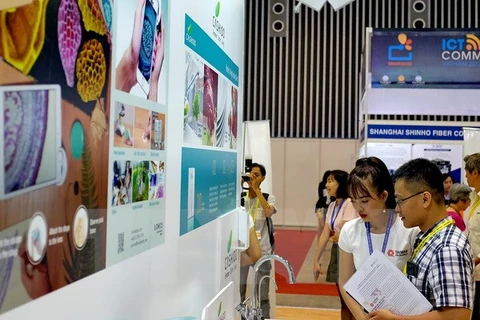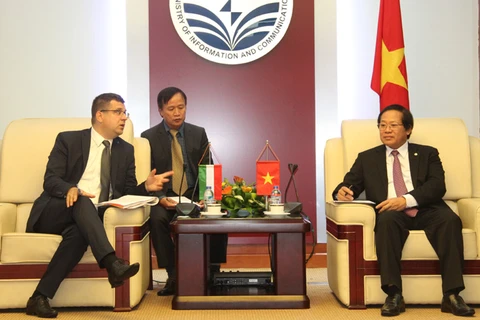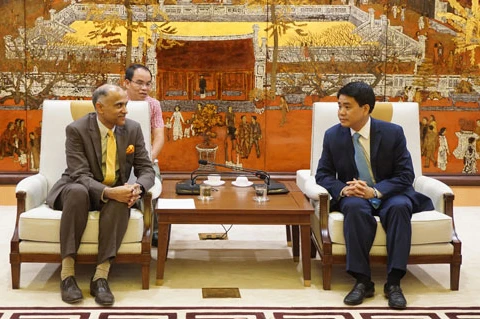Hanoi (VNA) – Deputy Prime Minister Vu Duc Dam has highlighted business opportunities in information and communication technology (ICT) in Vietnam on the back of its 100 million population with 60 percent aged below 35 and many subscribing to Internet.
Speaking to the annual Vietnam ICT Investment Forum 2017 held in Hanoi on October 18, Dam said Vietnam has become a destination for foreign ICT firms. Last year, the domestic ICT sector earned over 67.69 billion USD, more than 60.78 billion USD of which was from exports, mostly contributed by foreign investors.
Vietnam is improving business climate to attract ICT investment, he said, adding that ministries, agencies and associations have launched IT workforce training programmes to meet demand.
He described data as an especially important resource in a digital economy amid the fourth industrial revolution (Industry 4.0), saying that the government and sectors are collecting data for joint use.
Minister of Information and Communications Truong Minh Tuan expressed his belief that amid the trends of Internet of Things (IoT), Big Data and artificial intelligence, investors will succeed in Vietnam thanks to the government’s incentives.
In order to fully tap advantages brought about by Industry 4.0, Tuan said the ministry will create a supportive ecosystem to connect domestic and foreign units with the government as well as partner with the Ministry of Education and Training, associations and business community to promote the training of high-quality IT workforce.
In the near future, Vietnam will prioritise ICT development at home and gear towards ASEAN and global markets, he said.
Participants highlighted opportunities and challenges in attracting investment in Vietnamese digital economy and proposed measures regarding legal framework, infrastructure, digital products and services, innovation and human resources.
On the occasion, forums featuring ICT policies towards attracting investment attraction in digital economy, and digital economy market: investment opportunities and challenges were also held.
ICT firms also attended a business networking exhibition introducing new products.
The Vietnam ICT Investment Forum aimed to connect domestic and foreign ICT investors, especially in e-commerce, smart city, Internet of Things and start-ups.-VNA
.
Speaking to the annual Vietnam ICT Investment Forum 2017 held in Hanoi on October 18, Dam said Vietnam has become a destination for foreign ICT firms. Last year, the domestic ICT sector earned over 67.69 billion USD, more than 60.78 billion USD of which was from exports, mostly contributed by foreign investors.
Vietnam is improving business climate to attract ICT investment, he said, adding that ministries, agencies and associations have launched IT workforce training programmes to meet demand.
He described data as an especially important resource in a digital economy amid the fourth industrial revolution (Industry 4.0), saying that the government and sectors are collecting data for joint use.
Minister of Information and Communications Truong Minh Tuan expressed his belief that amid the trends of Internet of Things (IoT), Big Data and artificial intelligence, investors will succeed in Vietnam thanks to the government’s incentives.
In order to fully tap advantages brought about by Industry 4.0, Tuan said the ministry will create a supportive ecosystem to connect domestic and foreign units with the government as well as partner with the Ministry of Education and Training, associations and business community to promote the training of high-quality IT workforce.
In the near future, Vietnam will prioritise ICT development at home and gear towards ASEAN and global markets, he said.
Participants highlighted opportunities and challenges in attracting investment in Vietnamese digital economy and proposed measures regarding legal framework, infrastructure, digital products and services, innovation and human resources.
On the occasion, forums featuring ICT policies towards attracting investment attraction in digital economy, and digital economy market: investment opportunities and challenges were also held.
ICT firms also attended a business networking exhibition introducing new products.
The Vietnam ICT Investment Forum aimed to connect domestic and foreign ICT investors, especially in e-commerce, smart city, Internet of Things and start-ups.-VNA
.
VNA























